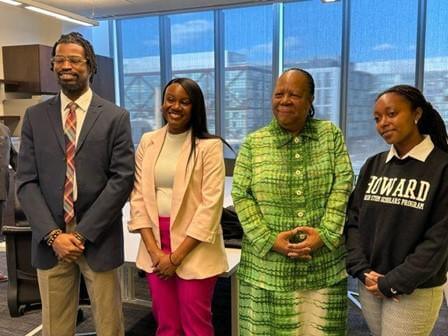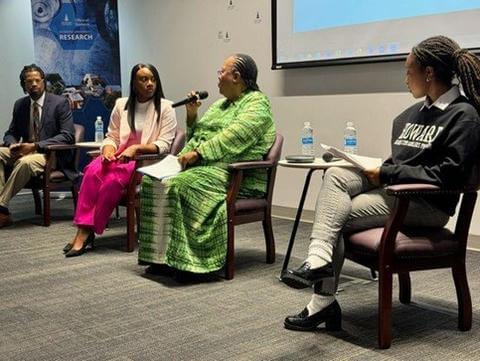Students Discuss South African Foreign Affairs Minister’s Visit to Howard University

Howard on Africa In-Brief
A publication of the Center for African Studies, Howard University
Students Discuss South African Foreign Affairs Minister’s Visit to Howard University
Prepared by DaQuan Lawrence
April 9, 2024
Photo: South African Minister of International Relations, Dr. Grace Pandor and Howard University students in the Interdisciplinary Research Building. Shown here, Howard University Ph.D. students DaQuan Lawrence and Jessica Moulite, Minister Pandor and Howard honors student Syndey Sauls. Photo courtesy of Jeronimo Augusto.
Dr. Grace Naledi Mandisa Pandor engaged in an in-depth conversation with Howard University stakeholders, discussing various topics including South Africa’s stance on global issues.
During an international diplomacy trip to the U.S., Dr. Grace Naledi Mandisa Pandor, who serves as South Africa’s Minister of International Relations and Cooperation and is responsible for her nation’s foreign policy, recently made a visit to Howard University for a fascinating event.
The discussion took place on March 20 in the Howard University Interdisciplinary Research Building. Under the theme ‘Speaking Truth to Power: 30 Years of South African Leadership on Black International Solidarity,’ Pandor discussed South Africa’s position on the Israel-Gaza war, international solidarity and her suggestions for improving the efficacy of the United Nations (UN).
“Our position is with respect to the plight of the people of Palestine, and is not in any way antisemitic, nor against the continued existence of Israel,” Pandor said.
“[South Africa] clearly has always supported a two-state solution, and we believe this is the only way to arrive at a guarantee of peace and security for both Israel and Palestine,” Pandor said to attendees.
Pandor’s diplomatic visit occurs during a unique moment in history and geopolitical affairs, as the U.S. and South Africa, which have strong bilateral relations, find themselves on opposite sides of the political spectrum regarding the longstanding conflict in the Middle East. Both nations are also two of the 64 countries scheduled to hold general elections in 2024.
The event was organized by students in Howard University's Department of African Studies and the Center for African Studies and took place during the eve of the annual commemoration of the Sharpeville Massacre of March 21, 1960, where scores of Black South African protestors were slain and injured while trying to change apartheid laws.
During her remarks, Pandor elaborated on the role developing countries and non-Western nations, such as South Africa, can play within the sphere of international affairs.
“The role that South Africa has assumed, is to try to increase the voice of what we call the Global South, in the face of deepening inequalities, and divisions in the international system,” Pandor said to the audience in a room that was filled to capacity.
“We do this because we believe the Global South is deserving of attention and deserving of support,” Pandor said.
“When we refer to the Global South, we're talking of those countries, regions and peoples of the world that don't reflect a forceful power on global affairs and global institutions, who are the victims of institutions that should support them,” Pandor said to members of the Howard audience.
“The event with Minister Pandor was eye-opening,” Jessica Moulite, a third-year PhD student at Howard University, said about the conversation.
“Being one of the three student panelists to engage with her and ask questions of a great world leader was a humbling experience,” Moulite said.
Originally from Miami, Moulite is focused on sociology for her doctoral studies and shared her perspective and takeaways from the event’s esteemed guest speaker.
“Minister Pandor emphasized the importance of calling out injustices and fighting for the world that we envision for us all,” Moulite said.
Before her tour of North America, South Africa’s top foreign policy official declared that she would focus on business opportunities and international diplomacy, during her trip to the U.S.
Throughout her visit, the Minister held meetings with members of Congress, and leaders from the private sector, faith community and think tanks such as the Carnegie Endowment for International Peace. In addition to meeting with anti-apartheid activists, Pandor stopped by the Mecca for an anticipated conversation with Howard University students and stakeholders before heading to Jamaica for diplomatic meetings.
The South African Broadcasting Company reported that Minister Pandor’s visit to Howard University would be one of the highlights of her busy schedule. While discussing ways the international economic system can be improved for all nations, Pandor addressed how prestigious multilateral organizations such as the UN, could be enhanced to better serve historically marginalized nations and populations.
“We really are trying to marshal countries that have suffered under development, racism and colonialism to understand that they do have a collective power, which they can use more effectively, to influence the direction of world affairs,” Pandor said.
Sydney Sauls is a sophomore environmental science major at Howard University, who is triple minoring in Spanish, chemistry and biology. After the event, Sauls, who asked Pandor about the growing international issue of climate change and environmental justice, shared her outlook on the event and the unique experience of being a Howard student.
“It was educational and a cool event for me to participate in at just 19 years old. The event was a great representation of what it means to be a Howard student,” Sauls, who is originally from Baltimore, Maryland, said.
“On any day celebrities or political figures might be on campus and we should be ready to greet them and make a great impression,” Sauls said.
Howard University currently has over 800 students enrolled in African language courses, the most of any educational institution in America. As a Title VI institution that receives funding from the U.S. government, the Center for African Studies seeks to connect Howard and historically Black college and university (HBCU) students with opportunities in Africa.
Sauls also shared that she was impressed to hear how people from around the globe can collaborate with South Africans outside of government affairs and how she believes Howard students should be interested in international careers and professional opportunities.
“I learned that the African diaspora might not be as disconnected from our roots as I thought,” Sauls said.
“Howard University students should be interested in international careers because we have an institution with connections to every continent. Howard and South Africa have been intertwined since the anti-apartheid era, so it's important that students continue to maintain this legacy of collaboration,” Sauls continued.
Before concluding her remarks, Pandor highlighted the role that multilateral institutions such as the International Monetary Fund, the United Nations and the World Bank have in upholding current international governance mechanisms via international law.
“We believe the premier global institution to protect all of us universally and uphold our rights in the Global South, is the United Nations,” Pandor said.
“We must address the reform of the UN, and in particular, the Security Council, as well as the Bretton Woods institutions that are responsible for international development and finance,” Pandor finished.
Moulite noted the importance of such commentary by an international politician and called attention to Pandor’s statements about international solidarity and the historical and contemporary importance of people around the world continuing to seek institutional justice, despite the current iteration of international law and governance.
“This fight is one that we cannot get tired of fighting because not only are others depending on us, but we also have to fight for our ancestors in the struggle who also wished to see a better, more just world,” Moulite said.
DaQuan Lawrence is a Ph.D. Candidate in the Department of African Studies at Howard University.
Acknowledgements:
Howard on Africa in Brief is published by the Center for African Studies at Howard University. Contributors include prominent scholars, policy makers, Howard faculty, alumni and graduate students. Our papers provide open access to research and make a global contribution to understanding Africa-related issues. The views, positions, and conclusions expressed in this publication are solely those of the author(s).

